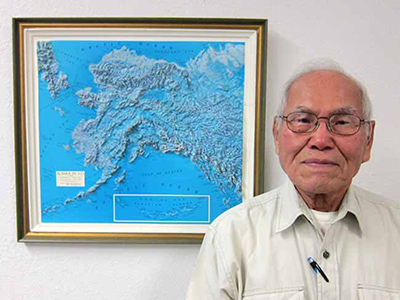Guidelines for Interviewing Elders
Note from author: All students can benefit from intergenerational contacts. In Alaska Native cultures grandparents were held in high regard as they contributed to the community by passing on knowledge and skills. Children learned by listening to and watching Elders and often didn’t realize they were in training.
- Bringing in Elders to classrooms can be an experience for the Elder, teachers and students.
- The way to ask Native American Elders for help is different from Western customs.
- Get to know the Elder by initial and subsequent contact should be subtle visit with them allowing time for the conversation to wander. Allow for extended pauses. Give them time to think and decide.
- If their hearing is poor, sit on the side of their better ear. Make sure they can see your lips. Direct eye contact should be limited. Stand or sit with comfort will show the Elder a comfort level. Keep your questions basic and specific.
- Begin the request by telling a little story about your class and how the Elder could help.
- Ask if the Elder is comfortable and ask if he or she needs water or tea.
- Ask if he or she feels his story or subject will be helpful to the students.
- Always ask the Elder if it’s okay to take pictures and permission to audio or video record. Do not show up with equipment before consent.
- If an Elder agrees to participate in a classroom suggest an activity or topic outline so they know what you are expecting.
- It is helpful to explain the routine consequences for student misbehavior.
- It is your responsibility to ensure discipline is maintained.
- When the Elder arrives, properly introduce him or her so the Elder understands your respect for them.
- Give the Elder a chance to use traditional discipline.
- Be patient and allow the Elder to share their culture in their own way. Your students are learning to listen.
|
|
 Robert Charlie, 2011, Fairbanks Daily News Miner photo Robert Charlie, 2011, Fairbanks Daily News Miner photo
- Always allow time for questions after the Elder is done talking.Teacher should have simple evaluation forms for student to fill out for presenter before he or she leaves or thank you letter, photos, or certificate of appreciation.
- Sometimes you will find an Elder who is knowledgeable about a lot of subjects or is well liked by students. Make some kind of exceptions.
- When Elder is done have students line up to shake his or her hand or a big standing ovation.
- Finally, to the teachers, learn more about your students if they show a lot of interest in education. Help them to make it through each day and say, “You’re cool.”
Author: Robert M Charlie |
|
 Robert Charlie, 2011, Fairbanks Daily News Miner photo
Robert Charlie, 2011, Fairbanks Daily News Miner photo